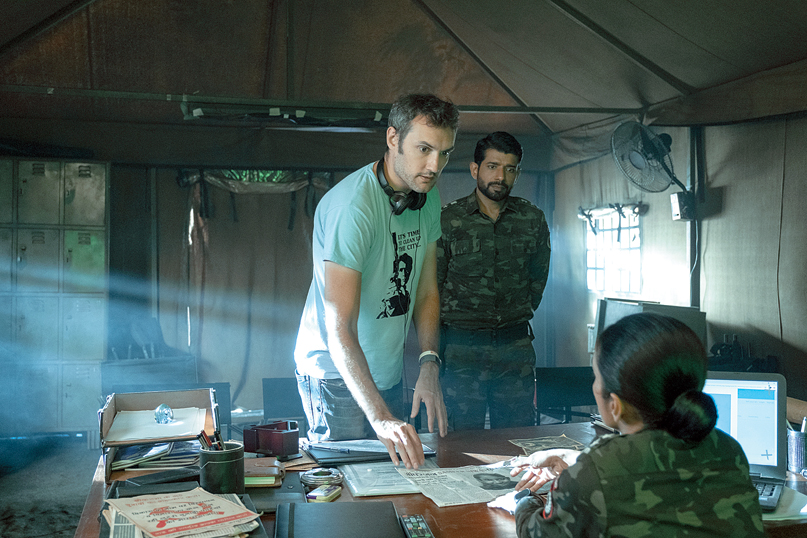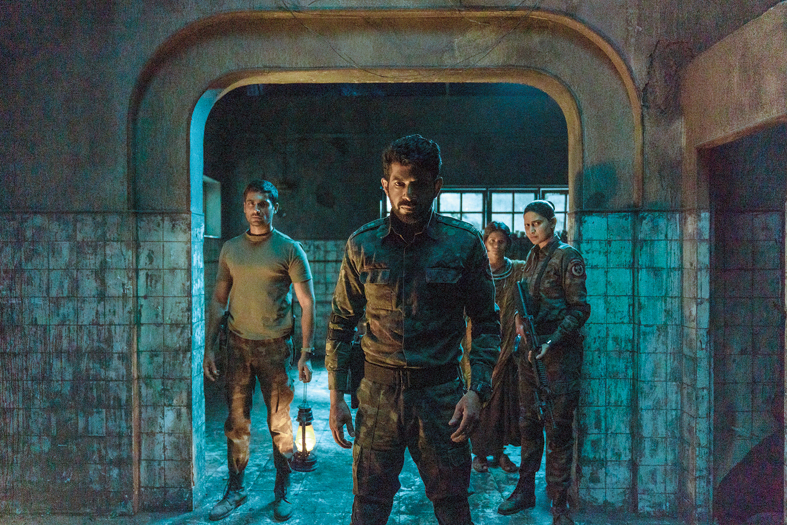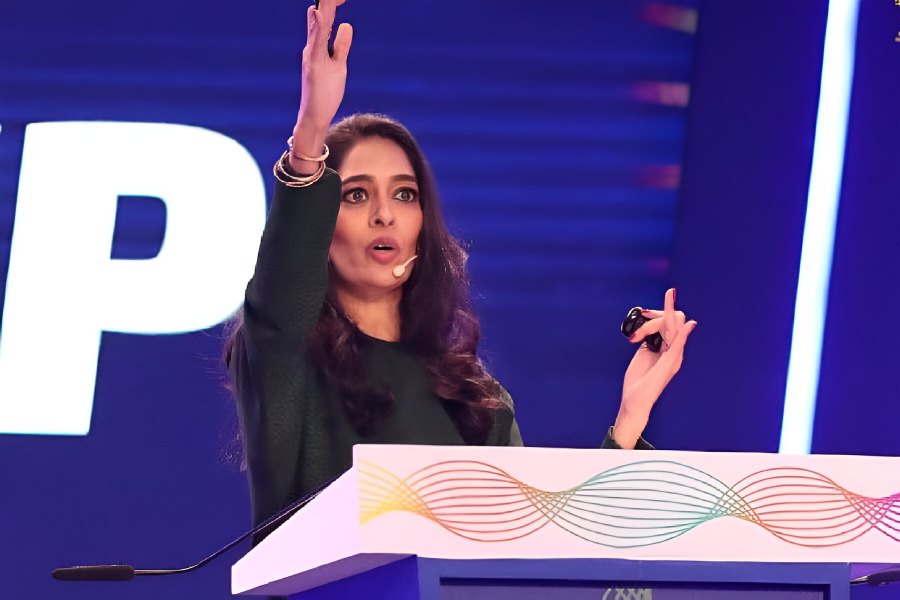Two years ago, Patrick Graham churned out Ghoul, a dystopian horror series, frontlined by Radhika Apte, that not only brought on the scares, but was also a scathing socio-political commentary. Ghoul, streaming on Netflix, turned out to be a winner.
This Sunday, the British filmmaker returns to Netflix with yet another horror offering. Betaal, a four-episode series that draws inspiration from the Vikram-Betaal legend and focuses on an undead army comprising zombie redcoats, has been written and co-directed (with Nikhil Mahajan) by Graham, with Shah Rukh Khan’s Red Chillies Entertainment backing the project. It stars Viineet Kumar, Aahana Kumra and Suchitra Pillai.
Like Ghoul, Blumhouse Productions — the Hollywood name that’s been responsible for recent horror films like Get Out and Insidious — is attached to Betaal. The Telegraph chatted with Graham, a London Film School alumnus, on the genesis of Betaal, his fascination for horror and why he’s chosen India to tell his stories.

Patrick Graham (left) on the sets of Betaal Sourced by the Telegraph
The trailer of Betaal promises a scary ride. Has the messaging so far been as effective as you had hoped it would?
It’s been a largely positive response, I think. I mean we are all living in our own bubbles at the moment, aren’t we? (Laughs) It’s tough to know what people are actually thinking. The horror genre is deeply polarising... some people will find some things scary, while others won’t. There’s always going to be disaparaging comments like, ‘Oh, this looks stupid’, but that’s okay. It’s been quite positive, though.
Ghoul was an undisputed winner. What is it about horror that fascinates you so much?
I enjoy scaring people and being scared myself! (Laughs) I am still a bit of a child at heart... I like jumping on people every now and then and giving them a shock. I also love spooky stories and I love listening to peoples’ experiences of encountering the supernatural. But honestly, I was quite a coward as a child and I had quite a few nightmares growing up.
Also, in India there’s kind of a gap in the market when it comes to horror and other related extreme genres... we don’t see much content coming out. So, there’s a lot of stuff that we can do for the first time. For example, a zombie horror series like Betaal is probably the first of its kind here. Filmmakers can do so much... horror is a very fertile ground for telling new stories.
What was the genesis of Betaal?
My all-time favourite horror films are Night of the Living Dead (1968) and Dawn of the Dead (2004), which I believe are the big daddies of the zombie genre. They are basically seige zombie films where you have an army of the undead holding captive a band of survivors. I have always wanted to do something in that space.
I also thought the idea of redcoat zombies (undead soldiers belonging to the erstwhile East India Company that ruled over India) would be fun because we haven’t seen that anywhere else in the world. It also seemed like an obvious idea that would work (laughs).
From that small seed of an idea, I started researching Indian mythology to find a monster that would work for a story like this. I hit upon the Vikram-Betaal story and what Betaal represented even before the story became about Vikram and Betaal. So, as a vampire demigod, I thought he would be a cool monster to have as the master of this army of ‘preits’, namely, hungry spirits that can never be satisfied. I thought that kind of an Indian-Asian monster would work well.
What were the challenges of making this show and co-directing it with someone else?
Having a co-director actually alleviated a lot of the challenges because I had someone to share the workload with, as well as a second pair of eyes. I found working with Nikhil (Mahajan, who has previously directed Marathi films like Baji and
Pune-52) to be a good process because he boosted me when I was down and I could boost him when he needed it. We kind of worked with each other very well. We just divided up scenes based on what we felt passionate about doing.
Challenge-wise, it was as challenging as any other film shoot. Because this is the horror genre, we had to be much more stylised and extreme with the look and the treatment. That was something which was a bit tough to fit into the schedule we had... it would have been nicer to have had a little bit more time. But it’s always like that, so it’s fine.
How would you sell Betaal to someone who hasn’t watched too much of the zombie genre and to another who has consumed a lot of international content in the genre?
For someone who hasn’t watched much of the genre, I would say that besides the scares, it’s also a story that spans drama and emotion. There’s redemption in the face of this terrifying army of undead Britishers who have to be fought against by a modern army with modern weaponry.
For those familiar with the world of zombies, I would say that if you have watched Kingdom, Train to Busan, 28 Days Later, Night of the Living Dead... then you are going to like this. It’s traditional zombie siege horror where we have created monsters that haven’t been seen before. We have also given it an Indian setting, which lends it an air of originality in the space that we are working in.
The horror genre is virtually unexplored in India and even when it’s attempted in mainstream Bollywood, it’s diluted with elements like romance, song-and-dance and erotica. How do you think one can shake things up?
I think horror in India really needs to be moved out of this trash category it’s been largely relegated to. Horror doesn’t have to be this childish, titillating piece of nonsense which has to tick certain boxes and have a jump-scare every three minutes. That’s not what horror has to be. It doesn’t have to be a Halloween special aimed at young teenagers, you know. It can be mature and like any other good story, horror should have solid drama. When people make horror, they feel they need to tick the jump-scare and titillating scenes boxes and they feel that just because it’s horror, they don’t need to write a good story. But the truth is that if you don’t have a good story in any film, it can turn out to be utterly rubbish.
You are a rare filmmaker who’s made India your home to tell your stories. What propelled that move and how has it worked out for you so far?
It was unemployment that propelled the move to India! (Laughs out loud) The desperation for work, to be honest. I moved because I wasn’t having much luck in London. I came to Mumbai to work with a friend. And I stayed on because I liked it and I was getting more opportunities here. But whether I was in England or India, I would have been telling similar stories. Honestly, think it’s better that I am in India because I get to tell stories from a completely different perspective and I get to explore things.
For example, if Betaal was a British or an American show, we would have seen many, many similar kinds of shows in the same space. This is new to India and because this zombie show has been given an injection of the culture here, it makes it completely different from what we have seen before here... I hope (smiles).
Any plans of moving away from horror in the near future?
Yeah, yeah... absolutely. I do want to branch out into other genres soon. I have one more horror series left, and after that I am done!
Which is your favourite zombie film/ series? Tell t2@abp.in











